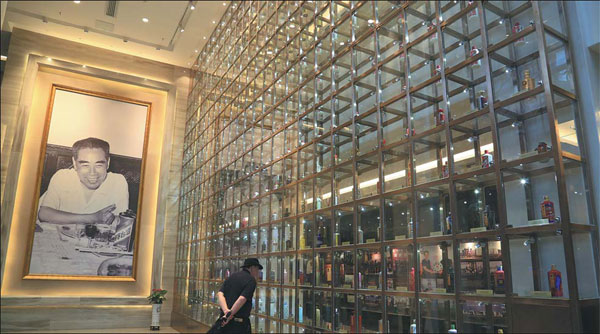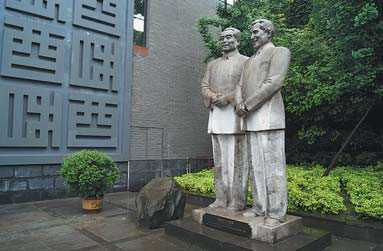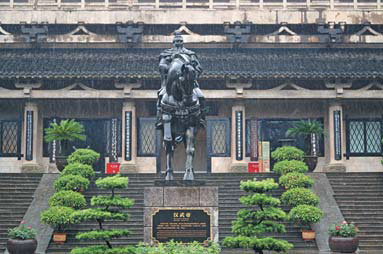Firewater museum traces long brewing history
Ancient legends, cultural values lead to prosperity in modern times
In My Autobiography, Charlie Chaplin recalls that as a lonely man in Hollywood in 1932, he considered retiring to China. That was, of course, before he met actress Paulette Goddard and changed his mind.
Chaplin had a deep interest in China, an interest that attracted the attention of premier Zhou Enlai. In 1954, Zhou invited the movie icon to have dinner with him in Geneva.
The drink served at their dinner was a high-end baijiu called Moutai from the southwestern Guizhou province, the de facto national drink of China. By then, Moutai's fame as a spirit that packs a fiery punch had already reached the West.
Afterwards, the story goes, Chaplin declared to the waiting press that Moutai was the "drink of real men".
That is a comment the Chaplin Office in Paris, which represents the actor's rights-holding companies, is unable to confirm, but in his autobiography Chaplin says Zhou and he "drank Chinese champagne (not bad)".
A statue marking the historic meeting now adorns the courtyard of the Kweichow Moutai Group's liquor museum in the small town of Maotai - a tribute to Zhou's efforts to popularize the sorghum-based firewater.
No wonder it is one of the most photographed exhibits at the 30,000-square-meter museum, formally known as the Chinese Liquor Cultural City of Kweichow Moutai.
The museum opened to the public in 1998 after five years of construction. It has since attracted an average of 300,000 visitors a year, among them politicians, foreign dignitaries, artists and liquor aficionados.
The building, designed by a firm based in Guizhou's Anshun, is stunning and is surrounded by the breathtaking landscape of Maotai and the pristine Chishui River, the source of water for the beverage.
As you enter the site, a huge statue of Emperor Wu from the Han Dynasty (206 BC-220) greets you. An inscription says it was Wu who established the system of wine sale, which not only enriched the state treasury but also had a far-reaching impact on future generations.
"In 135 BC, Emperor Wu tasted Jujiang, which had been brewed in the Chishui water basin, and admired it, calling it 'so sweet and refreshing'."
Jujiang is a type of fruit drink.
Inside the first hall, there are audio-visual presentations covering the origin of liquor in general and that of Moutai in particular, and how the production process evolved over time.
One exhibit narrates the story of how Du Kang, the sixth ruler of the Xia Dynasty (2070 BC-1600 BC), accidentally made liquor.
"The grain he stored in a mulberry tree hollow fermented and became liquor by accident. He was said to be the first person making liquor out of grain."
In fact, an early second-century inscription from the Han Dynasty records that "Du Kang made liquor from sorghum".
As you leave the first pavilion, you come across a lineup of master brewers, followed by an intoxicated person and a display of various stages of liquor production - all in sculptures.
In all, there are eight pavilions with thousands of artifacts showcasing various aspects of liquor making, brewing techniques and drinking vessels.
There are also exhibits displaying how Moutai was used to treat wounded soldiers during the Red Army's Long March (1934-1936). Another shows how Red Army engineers managed a series of river crossings.
A massive collection of spirits from around the country is the main attraction of the eighth and newest pavilion where the museum tour ends.
"The exhibit that tells the story of the Moutai brewing technique is the most popular among visitors," said museum guide Mu Zongmei. "It's not the Moutai liquor that is intoxicating the visitors. It's the beautiful artifacts on display here, the scenery around the museum and the fragrance in the air."
Britain's Prince Andrew made a tour of the museum in late 2014 and signed the visitor's book.
"He wrote nothing, but said Moutai was a legend," Mu said.
A legend, indeed.
State-owned Kweichow Moutai became the sole producer of the liquor after it took over breweries owned by three families in the early 1950s.
The company has since become the mainstay of the region, offering thousands of well-paying jobs. Its contribution to Guizhou's public revenue was estimated at 10 percent last year, but the company's influence reaches far beyond the provincial borders.
Its flagship product remains Moutai - the Feitian 53 degrees to be exact.
It is produced under a rigorous process that involves multiple stages of quality control and takes five years to hit the market. In recent years, the company has also started offering custom-made drinks as well as products aimed at women.
And talking of women, more than half of the company's 90 taste masters are women, a fact of which Moutai is extremely proud.
"Even I was a taste master," said Peng Jing, who as an assistant deputy director of liquor storage is the top female executive in the company.
Peng was a first-class taste master before she rose through the ranks to reach her current position.
The global market for baijiu is estimated at about $23 billion, most of it in China, and interest in the spirit is growing.
But has the central government's clampdown on lavish official spending affected Moutai's domestic sales?
"Absolutely, not," said a senior executive who requested anonymity. "Our entire 2015 production is sold out."
The company, however, acknowledged that it is being targeted by counterfeiters. To address the issue, the firm has deployed a team of 70 inspectors who can quickly identify fake Moutai.
"We're well equipped to fight this battle," the company said.
abdul@chinadaily.com.cn
|
A huge shelf of Moutai liquor bottles stands next to a picture of premier Zhou Enlai at the Chinese Liquor Cultural City, a liquor museum, in Maotai town. Zhou used Moutai to greet foreign leaders on many diplomatic occasions. Yang Jun / China Daily |
|
The statue of premier Zhou Enlai and Charlie Chaplin at the Chinese Liquor Cultural City in Maotai town. Photos By Abdul Latheef / China Daily |
|
A statue of Emperor Wu of the Han Dynasty greets visitors at the entrance to the museum. |
(China Daily 07/21/2016 page7)

















